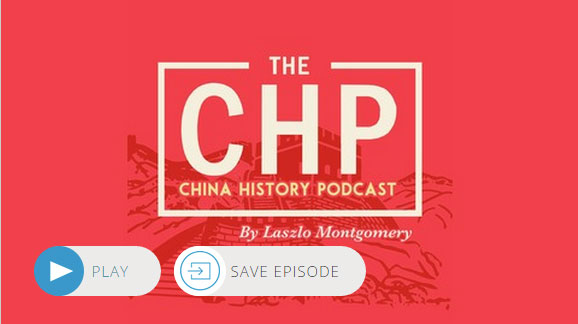Host sheds light on long Chinese history
By LIU YINMENG | China Daily | Updated: 2019-10-16 10:16

Podcast of more than 200 episodes in English attracts fans all over the world
In 2010, Laszlo Montgomery came up with a shortlist of about 150 ideas for an ambitious project: a podcast focusing on topics from more than 5,000 years of Chinese history.
With 226 episodes so far, he has yet to run out of ideas for a hobby that turned into a popular channel with fans from all over the English-listening world.
Montgomery now receives topic suggestions from listeners every week. This week, for example, he was asked to devote an episode of the China History Podcast to the War of the Eight Princes in the Western Jin Dynasty (265-316), he said. Last week, someone else asked him to cover the history of Macao.
"Five thousand years of history,… It's doubtful I'm ever going to run out of potential topics," he mused.
The podcast started out as a means for people in the United States to learn about Chinese history and gain a basic understanding of and appreciation for the culture, Montgomery said.
In a casual storytelling style, Montgomery presents the various emperors, dynasties, heroes, revolutions and great leaders of China. The topics have ranged from the history of Chinese philosophy and the history of Chinese Tang poetry, to the history of Jewish refugees in China and China's relations with Vietnam.
His most recent episode, uploaded on July 14, 2019, is part one of a three-part series introducing audiences to "the seven great singing stars of old Shanghai" who dominated the Chinese popular music scene in the 1930s to 1940s, and whose music helped shape Chinese cinema.
Montgomery said that only 50 percent of his listeners are in the US now; the other half come from the rest of the world. Most of his listeners are from English-speaking countries, such as Canada, Australia, the US and New Zealand. But traffic also comes from Germany, Sweden and Norway, as well as Southeast Asia and China
Montgomery, 60, grew up in a tight-knit Jewish community in Illinois. He traces his interest in China to 1979, when he was a student at the University of Illinois.
That year, Chinese leader Deng Xiaoping paid a historic visit to the US, after the formalization of diplomatic relations between the two nations. The milestone trip, which marked the opening of a new chapter in Sino-US relations, inspired the young Montgomery to study Mandarin at his university.
He moved to Hong Kong in 1989 and lived there until 1998. Throughout his career, Montgomery worked for three Hong Kong and mainland public companies in sales, marketing and new business development.
"I'm not a professor. I'm a salesman, so I use my sales technique to introduce Chinese history," he said.
To him, understanding is the root of acceptance.
"The better people understand Chinese society, the better the chance is of finding common ground. For such a long history, rich culture, and an epic list of achievements as a people and nation, this should be the easiest story in the world to tell," he said.
That is probably why Montgomery gave a speech at Harvard University last November entitled Don't Forget the Good Times, which was intended to remind people to keep a cool head and not to forget some of the important moments in history when the two countries got along better.
"The US and China have come together in positive ways many times in the past, and despite our differences in culture and how we view each other … both countries have gained so much from the relationship and have become better countries because of this interaction with each other. And look at how much America has benefited thanks to Chinese immigration," he said.
For example, after the US became an independent country and was no longer bound by the East Indian Company monopoly on China trade, US traders made a beeline to China in 1783.
The early commerce in tea, silk and porcelain boosted the US economy when it was desperately needed. A lot of US ginseng was exported to China, among other commodities, Montgomery said.
In 1941, the American Volunteer Group, also known as the Flying Tigers, came to China's aid during Japan's invasion of China.
"All these great moments in diplomacy, in commerce, education and moments where we held hands together for a common cause,… as much as we try to hide this or downplay its importance, …let's not forget it in the face of the challenges and hard feelings both sides share today," he said.
His fan base is a perfect example of a group of people drawn together through a shared interest and appreciation of Chinese culture.
























